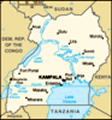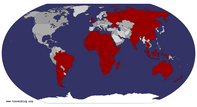Advertisement
Published: January 25th 2005

 Africa
Africa
From the campsite by the NileAs with Rwanda, Uganda is a suprising country. I'm fairly sure that, ever since a young age, I have not believed greatly in democracy, preferring the idea of a benign dictator as the most preferable form of government. Clearly in the real world this is as unrealistic as socialism or communism, except perhaps in rare cases. Now I'm completely out of my depth here, having learned most of what I know of Ugandan politics from guide books and a dodgy daily rag that would make the Sunday Sport editors blush. It seems that Musaveni, the Ugandan president for the last 20 (?) years, comes pretty close to fullfilling the benign dictator roll successfully. I'm sure his human rights record is as bad as any western government one would care to mention, and Uganda has huge problems to solve ( violence and insurgency in the North and occasionally in the Southwest, bordering on the Sudan and the DCR, 1 million orphans from aids, in a population of ~24million ), but the progress siince the rampant and reckless destruction of Amin is immense, making Uganda one of the safest and most pleasant countries in this part of Africa.
Musaveni took control by

 Thieving vervet
Thieving vervet
looking guilty at the campsite in Kampalabeing one of the few people able to organise and lead a disciplined rebel fighting force - seemingly using similar organisation and tactics to the Viet Cong. For many years he successfully governed as a dictator with a popular mandate, (very New Labour) avoiding elections and the wastage associated with party politics - he just got things done. He remains in power, I suspect largely due to this positive record, and it seems he has succeeded in helping his country greatly.
To summarise Uganda, and probably much of Africa, I'd like to contrast two experiences.
Those of our group that chose not to tackle the big water on the Nile went to help paint a local primary school. This was organised by a British (I think) charity working in the area. Our punters enjoyed the painting, but it was spoiled somewhat by a large audience of adult male Ugandans, who spent the time just sitting staring at them. A peak was reached when, hot and thirsty, they asked for a jack-fruit to share, and were made to pay. The representative of the charity threw the money at the feat of the local farmer in disgust. It was not
all bad - the head of the school was genuinelly thankful - it just seems a shame that the locals couldn't be bothered to get of their arses to help their own kids. Debs on the truck is reading "Dark Star Safari" by Paul Theroux. I've not read any of his books for a good fifteen years but I remember finding him fairly dismissive of the people he meets on his travels. In D.S.S. he is extremely anti the charity workers he comes across, berating them for creating a dependency culture. I guess we are starting to see some evidence that he may be right - and it makes me think that one needs to consider the meanings of "aid" and "charity". Other evidence we saw was near the Ugandan/Rwandan border, where the shops were full of UN aid supplies, too expensive for us on our meagre Exodus budget. And finally we noticed that, on our drive back from the gorillas, all the hands that in the morning had waved to us in greeting were now outstretched in want - presumably they also were tired after a long hard day.
But all is not bad. At Lake Bunyoni near
the Rwandan border Kim and I decided to climb the big hill behind the lake to get the view. Almost immediately we were surrounded by scruffy tykes straight out of an African 'Oliver'. Seven of them, aged between about 3 and 13, came with us to the top of the hill, which was probably a good job as there was no real trail. Needles to say they were all very fit, even the three year old. As with the Turkana they all found the digital camera fantastic, being able to take photos and then seem themselves. THey had to have a go, and the eldest seemed familiar enough to operated it quite well. The view of the lake was outstanding and well worth the hike, but of course we were constantly plagued with the guilt that we were not prepared to give our impromptu guides any money, pens or sweets. The problem was resolved when we reached the top and found a posh campsite with a bar. We bought them three cokes and seven straws. Then we watched in amazement, as without fuss or squabbling, they organised themselves into three groups and happily shared the drinks so that even the
little one got his share. It was heartwarming.
The view and our reveries were interrupted by a thunder storm which, as I had all my camera gear with me, threatened to prove perilous. We set of down the hill at a run, with the kids laughing and shouting behind us. About halfway down Kim noticed the little one was in tears as he couldn't keep up so he held his hand and they ran down together. When we hit the road Kim led them off in a final sprint for the gate and the kids were in rapture - I don't think they had ever seen a Mzungu behave so. For the record she managed a creditable second.
Once again the whole experience was both heartwarming and heartbreaking. These kids, some of whom were certainly orphans, were genuine, friendly and helpful. The elder girls conducted themelves with real grace.
Once the camera was safely stowed we dived into Lake Bunyoni in the middle of the deluge and swam for half an hour, whilst Kingfishers dived feet away from us, and a pair of otters watched from a more cautious distance.
On our third crossing of the equater (once in Kenya and twice in Uganda) we stopped to watch the Coriolis man. This was quite impressive. Our two astrophysicists endevoured to ensure the experiment wasn't rigged, making him use the same bowl in each hemisphere and on the equator itself. We also ensured all rotation in the water had stopped before the experiement started. Sure enough, the water drained anticlockwise in the southern hemisphere, clockwise in the Northern hemisphere, and straight down when actually on the equator, very fast. We tried it ourselves when the man had left and it definitely seemed to work.
And finally, my first and last white water rafting experience, on the Nile River a few km down from the Lake Victoria. The rapids here are very big (grade 5 upwards) but it is a safe river, relatively free from rocks and stoppers. The flow is controlled by the hydro-electric dam upstream. It was high water when we went which mean't some of the grade 4's were more like grade 5's. We rafted for more than 30km in 5 hours, which was pleasant as we got to see some scenery as well being thrown around in the water. I have to say that on the whole I didn't really enjoy the experience. Rafting seems to be a very on or off sort of experience - if the waves aren't bi enough to flip the boat it is dreadfully dull, and if they are (as plenty on this stretch of the Nile are) your chances of flipping if you hit them straight on are probably >80%. Once in the water I couldn't really describe the spluttering and gasping for breath as exciting - just frightening and eventually tedious as well. Due to the gung-ho element in our truck we were the only raft to hit all the biggest rapides head on, taking the hardest lines. Needless to say we spent a lot of time in the water, to the point where the raft almost became redundant. We might as well have just jumped out of the raft at the top of the rapids. We did experience surfing on one of the holes for about 90s, which was quite an experience. Kim and I got out before the last rapid, "the Bad Place", which is claimed to be the largest commercially rafted 'hole; in the world (it is actually the smallest hole on a long stretch of staggering grade 6 river, that they only tackle in kayaks). I would say it was probably 4m from bottom to top, and the raft just slammed into it, rose vertically and flipped over backwards, in the space of less than a second. It all looked very good in the video afterwards but I doubt I'll bother again.
The next day I had a kayaking lesson in a very unstable freestyle kayak which I enjoyed greatly. The American instructor spoke in awe of the local canoeists, one of the best of whom had guided our raft the day before - he is hoping for a top 20 place in the world champs having canoed hardly another rivers than the top of the Nile. It occured to me that a great warm weather winter holiday would be to spend a week there on a five day kayak course ... as long as you could eskimo roll before you came out the Nile would turn you into a good canoeist pretty damn quickly.
Advertisement
Tot: 0.08s; Tpl: 0.011s; cc: 13; qc: 23; dbt: 0.0322s; 1; m:domysql w:travelblog (10.17.0.13); sld: 1;
; mem: 1.1mb










